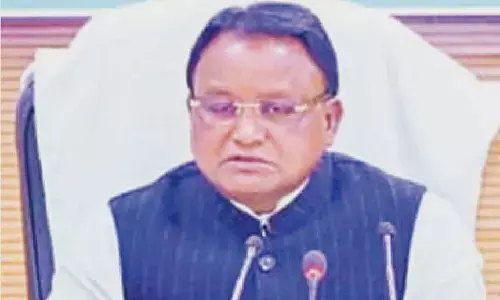Contractual faculty to be abolished

This policy has two advantages. One, institutions can design their own courses and students can choose a course of their interest
Taking the discussion on implementation of National Education Policy 2020 forward, Professor N V Ramana Rao Director, National Institute of Technology, Warangal told The Hans India that this policy has two advantages. One, Institutions can design their own courses and students can choose a course of their interest.
Earlier there were siloed-type of courses, such as a civil engineering, mechanical engineering or IT, but when they go to the field (industry), where different skills are required, they used to suffer as they did not have skills pertaining to other stream.
Now that flexibility is being provided so that a mechanical engineer can move towards IT or any other subject of his choice. This will help students to be more informed, more employable and knowledgeable.
Speaking on the concerns of certain core courses going unpopular, Professor Rao believes that one should identify the demand and supply for an educational course. If a course does not hold relevance in the modern times, then a student might not choose to go for it but if a core subject still holds immense value, then the curriculum can be fine-tuned and updated.
These concepts are already popular in Europe and America. In Hyderabad, Mahindra university, the institute runs only basic Ecole and the students decide which branch to opt for. The courses are inclusive, basic skills are introduced and then depending on the needed interest students will choose a branch. Professor Rao said.
He expressed delight that students won't be restricted to learn skills such as Artificial Intelligence at the enrolled institute and can seek information and required knowledge through online portals.
"The concept of a physical campus has broken now. One can actively pursue a degree and a technical training course of their choice at the same time," Professor Rao told Hans India.
The NIT director said that the provision to pursue technical courses, many of them for free, will allow people to re-enter into the industry and upgrade their skills and explore opportunities in different fields as per their interest. Among all the other branches of NIT, the Warangal branch has been the first one to implement NEP wherein every department at the institute is offering a minor course to its students. "Flexibility is now with the students… It is a need-based thing. A learner centric education (model)."
Professor Ramana Rao also said Ad-hoc and contractual system of hiring educators must be abolished, and that tenured track system must be instated. He believes that the faculty, once placed in an institute permanently, can be adequately trained, promoted and upgraded properly.
"If you don't promote a teacher on time, then it becomes a headache. So, now they (faculty) will be allowed to move up the ladder. Teachers will now be recruited through a robust system, with a tenured track system. They will be getting due promotions provided he/she meets the credit requirements," he said.
Another highlight of NEP is that those currently serving on an Ad-Hoc or temporary basis need to be made permanent through screening test and due recruitment process.
Similarly, "the UGC has laid down implementation strategies. It has come out with many new announcements such as conducting two-courses, and other circulars. Things are changing very fast. By 2030, everything (mentioned under NEP 2020) will be in place,"
On adopting the hybrid mode of education i.e., working and learning through offline and online classes, Professor Rao says that the institute was quick enough to adjust to the new mode of learning and NIT has created accessibility for students to the laboratories in person. He also mentioned that through Higher Education Financing Agency (HEPA), the NIT Warangal has done upgrades in the campus.










